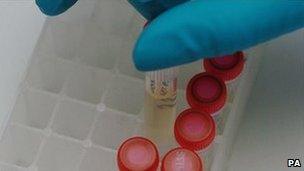Drug test powers boost for police in England and Wales
- Published

The tests will be carried out on suspects arrested for certain offences
All 43 police forces in England and Wales are to be given powers to carry out drug tests after arrests.
Pilot schemes began in 2005 and police in areas covered by 23 forces currently have the right to "test on arrest" when suspected users are held for offences such as burglary and robbery.
Home Office permission is currently required for such tests but now chief constables need only notify officials.
Ministers say the change will reduce "needless bureaucracy".
Crime Prevention Minister James Brokenshire said: "By scrapping the requirement for police to apply for authorisation to test on arrest, we are giving officers the flexibility to test where it is appropriate.
"Drug testing on arrest is a vital part of the work police and local partners do to reduce drug-related crime locally. We must give those who know what works in their neighbourhood the power to develop plans which meet local needs."
Bail conditions
The new powers give police the right to test people who have been arrested for certain "trigger offences" if officers have "reasonable grounds" to suspect they have used Class A drugs such as heroin or cocaine.
If a test is positive, the arrested person will be made to attend an assessment with a drug worker who will come up with a series of recommendations to support their recovery.
A positive test can also be taken into account by courts when setting bail conditions or sentencing.